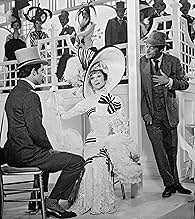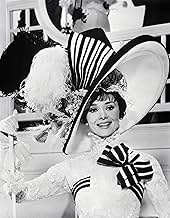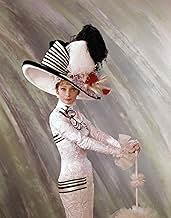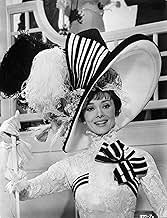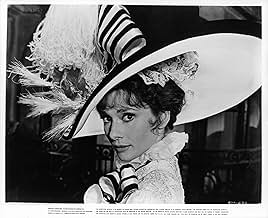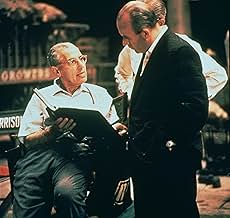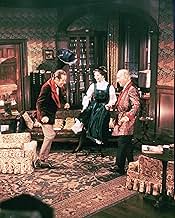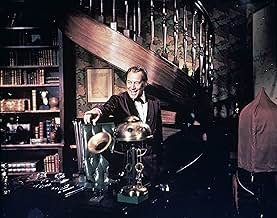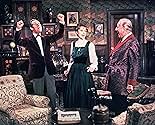Un profesor de élite de fonética acepta la apuesta de que puede transformar a una florista y hacerla presentable para la alta sociedad.Un profesor de élite de fonética acepta la apuesta de que puede transformar a una florista y hacerla presentable para la alta sociedad.Un profesor de élite de fonética acepta la apuesta de que puede transformar a una florista y hacerla presentable para la alta sociedad.
- Dirección
- Guionistas
- Elenco
- Ganó 8 premios Óscar
- 26 premios ganados y 13 nominaciones en total
David Ahdar
- Ball Guest
- (sin créditos)
- …
Elizabeth Aimers
- Cockney
- (sin créditos)
Helen Albrecht
- Ascot Extra
- (sin créditos)
John Alderson
- Jamie - Doolittle's crony
- (sin créditos)
Mary Alexander
- Cockney
- (sin créditos)
Gertrude Astor
- Cockney
- (sin créditos)
LaWana Backer
- Ad Lib at Church
- (sin créditos)
Walter Bacon
- Ball Guest
- (sin créditos)
Opiniones destacadas
There's a lot of negative things been said about Audrey Hepburn's interpretation of the role of Eliza. Perhaps she's not ideal in the earliest scenes of the movie - her "dirtiness" is never quite believable - but it has to be said that despite this smallish drawback she still glows, and makes an amazing Eliza overall.
The reason for this is simple; Audrey Hepburn brings her "own spark of divine fire", (to quote Higgins) to the role and her vulnerability, mixed with her sweet, naive charm and even her wonderfully juvenile pettishness shown in "Just You Wait" all prove what a talented actress she really is. For an example of this, just watch Eliza's facial expression at Ascot, when she realises her opportunity to demonstrate her new-found mastery of the English tongue - sweetly hilarious.
MFL has been criticized as being too romanticized, too overblown. I disagree; musicals are suposed to be lavish affairs, and none pull it off quite so well as "My Fair Lady" does. It's a momentous film but it has its subtle points: watch the way in which Eliza's eyes are centred on Higgins when she enters at the ball, and the way in which the two of them stare at each other for a few seconds at the top of the stairs a few moments later.
It musn't be overlooked that, thanks to its being based on a Bernard Shaw play, "My Fair Lady" has what the great majority of musicals lack: a deeper meaning and something really quite profound to say.
The actor in the role of Colonel Pickering is a little weak, but it must be said that Rex Harrison IS Henry Higgins. In a lot of ways (in fact, in most ways) Higgins has an objectionable personality: rude, snobbish, impatient and even misogynistic, but somehow Rex Harrison pulls it all off and makes us like Higgins without betraying the character. As to romance, his song "I've Grown Accustomed to Her Face" is an ode to the kind of love which sneaks up on you. Overall, this movie is romantic, but not too sentimental. It has just enough romance to be dramatically fulfilling, but it never becomes soppy or mawkish. The word "love" is never mentioned at all and the two leads never even kiss. The famous end sequence is perfect and does the movie justice; after all, a big happy bow tied around a perfect romance at the end would simply not fit with everything we have learned about the two protagonists.
The reason for this is simple; Audrey Hepburn brings her "own spark of divine fire", (to quote Higgins) to the role and her vulnerability, mixed with her sweet, naive charm and even her wonderfully juvenile pettishness shown in "Just You Wait" all prove what a talented actress she really is. For an example of this, just watch Eliza's facial expression at Ascot, when she realises her opportunity to demonstrate her new-found mastery of the English tongue - sweetly hilarious.
MFL has been criticized as being too romanticized, too overblown. I disagree; musicals are suposed to be lavish affairs, and none pull it off quite so well as "My Fair Lady" does. It's a momentous film but it has its subtle points: watch the way in which Eliza's eyes are centred on Higgins when she enters at the ball, and the way in which the two of them stare at each other for a few seconds at the top of the stairs a few moments later.
It musn't be overlooked that, thanks to its being based on a Bernard Shaw play, "My Fair Lady" has what the great majority of musicals lack: a deeper meaning and something really quite profound to say.
The actor in the role of Colonel Pickering is a little weak, but it must be said that Rex Harrison IS Henry Higgins. In a lot of ways (in fact, in most ways) Higgins has an objectionable personality: rude, snobbish, impatient and even misogynistic, but somehow Rex Harrison pulls it all off and makes us like Higgins without betraying the character. As to romance, his song "I've Grown Accustomed to Her Face" is an ode to the kind of love which sneaks up on you. Overall, this movie is romantic, but not too sentimental. It has just enough romance to be dramatically fulfilling, but it never becomes soppy or mawkish. The word "love" is never mentioned at all and the two leads never even kiss. The famous end sequence is perfect and does the movie justice; after all, a big happy bow tied around a perfect romance at the end would simply not fit with everything we have learned about the two protagonists.
Marni Nixon's singing in both THE KING AND I and WEST SIDE STORY sounded purer to me than did her work in MY FAIR LADY; I thought this was fine, but somewhat thinner and less rich (the voice may well have thinned a little by then). It's lovely to hear Hepburn in "Just You Wait," as it comes as something of a surprise if you had thought all of her singing was dubbed, as I once had. The dubbing and acting do seem to come to a perfect luminous moment at least once: at the end of "I Could Have Danced All Night" it seems as if Audrey Hepburn is really singing it and gives the impression that possibly no one else ever had. It is possible that the best result might have been to let some of the other simpler songs, like "Wouldn't It Be Loverly" be done by Hepburn, and leave those obviously requiring a more technically accomplished singer to Nixon.
It is interesting that Hepburn's "Moon River" is not included on the old soundtrack of BREAKFAST AT TIFFANY'S. Similarly, I went to her memorial service at the 5th Avenue Presbyterian Church here in New York in 1993, and, uncannily, the entire program was listed EXCEPT that... all of a sudden they played her "Moon River" and the whole church became very emotionally charged. I think we were grateful that this let us experience our grief directly by forcing something immediate (but not cruel) on us like that.
I have always been glad anyway that Hepburn did the part and it is certainly the only real reason the film still has life--the controversy about her getting the part may have as much to do with that "life" as anything: it would be a mere artifact, a duplicate of the stage production had Julie Andrews been chosen. Andrews still seems primarily a stage star despite all the movies she made. Most of them are mediocre,a few of them quite good even if I haven't found them interesting myself: she is perfect in THE SOUND OF MUSIC, but the phenomenal appeal of this film is based on something considerably less sharp than what made the earlier Rodgers and Hammerstein masterpieces great-- even when they weren't quite as lavishly produced. Clearly, for example, the score of SOUTH PACIFIC is light-years beyond that of THE SOUND OF MUSIC. Admittedly, Andrews's singing of the score is better than Mary Martin's was. And the voice you can still hear on the Broadway and London cast recordings of MY FAIR LADY is far more complex and rare than Nixon's is.
Still, she wouldn't have made the film unique: while it may or may not be a great film, it has managed to retain a one-of-a-kind quality, and is kept from being a mere facsimile.
It is certainly true that Ms. Nixon should have been credited for her work, whatever our other reservations are. I nevertheless think that some of the lighter opera voices of the time--maybe Anna Moffo or Mirella Freni--would have been better (I don't think Ms. Nixon was "too fine," but rather not quite as good here as she once had been.) Dubbing doesn't have to "match" all that perfectly; of course, certain examples--like Giorgio Tozzi for Rossano Brazzi as Emile de Becque do seem perfect. And if the case of MEETING VENUS is somewhat different, no one ever would dream of worrying about Kiri TeKanawa's voice not matching Glenn Close (Ms.Close unfortunately let us hear her real one doing Wagner on Entertainment Tonight when plugging the film--a harsh and strident moment...)
This is one of quite a number of cases in which the original star was controversially replaced. The strangest may be the rejection of Ethel Merman for GYPSY, although Rosalind Russell was excellent. The smartest may have been Barbra Streisand for Carol Channing for HELLO, DOLLY! She was high-voltage enough for the gargantuan production and her trumpet-like singing was magnificent--a number of us think this is her best film--and it ages fantastically. And, while it is not a matter of replacing a role originated by someone else, Hepburn herself was loudly denounced for BREAKFAST AT TIFFANY'S by Truman Capote; we think of the role as her indelible mark (and surely it is in some ways), but his preference for Marilyn Monroe could have unquestionably led to something extraordinary also--and maybe that idiotic ending that is so hard to overlook would have been replaced by the much more subtle and meaningful one Capote wrote.
It really is Audrey Hepburn who makes MY FAIR LADY continue to "do its work." And in it we may have well seen the most gloriously ripe moment of her incredible beauty.
It is interesting that Hepburn's "Moon River" is not included on the old soundtrack of BREAKFAST AT TIFFANY'S. Similarly, I went to her memorial service at the 5th Avenue Presbyterian Church here in New York in 1993, and, uncannily, the entire program was listed EXCEPT that... all of a sudden they played her "Moon River" and the whole church became very emotionally charged. I think we were grateful that this let us experience our grief directly by forcing something immediate (but not cruel) on us like that.
I have always been glad anyway that Hepburn did the part and it is certainly the only real reason the film still has life--the controversy about her getting the part may have as much to do with that "life" as anything: it would be a mere artifact, a duplicate of the stage production had Julie Andrews been chosen. Andrews still seems primarily a stage star despite all the movies she made. Most of them are mediocre,a few of them quite good even if I haven't found them interesting myself: she is perfect in THE SOUND OF MUSIC, but the phenomenal appeal of this film is based on something considerably less sharp than what made the earlier Rodgers and Hammerstein masterpieces great-- even when they weren't quite as lavishly produced. Clearly, for example, the score of SOUTH PACIFIC is light-years beyond that of THE SOUND OF MUSIC. Admittedly, Andrews's singing of the score is better than Mary Martin's was. And the voice you can still hear on the Broadway and London cast recordings of MY FAIR LADY is far more complex and rare than Nixon's is.
Still, she wouldn't have made the film unique: while it may or may not be a great film, it has managed to retain a one-of-a-kind quality, and is kept from being a mere facsimile.
It is certainly true that Ms. Nixon should have been credited for her work, whatever our other reservations are. I nevertheless think that some of the lighter opera voices of the time--maybe Anna Moffo or Mirella Freni--would have been better (I don't think Ms. Nixon was "too fine," but rather not quite as good here as she once had been.) Dubbing doesn't have to "match" all that perfectly; of course, certain examples--like Giorgio Tozzi for Rossano Brazzi as Emile de Becque do seem perfect. And if the case of MEETING VENUS is somewhat different, no one ever would dream of worrying about Kiri TeKanawa's voice not matching Glenn Close (Ms.Close unfortunately let us hear her real one doing Wagner on Entertainment Tonight when plugging the film--a harsh and strident moment...)
This is one of quite a number of cases in which the original star was controversially replaced. The strangest may be the rejection of Ethel Merman for GYPSY, although Rosalind Russell was excellent. The smartest may have been Barbra Streisand for Carol Channing for HELLO, DOLLY! She was high-voltage enough for the gargantuan production and her trumpet-like singing was magnificent--a number of us think this is her best film--and it ages fantastically. And, while it is not a matter of replacing a role originated by someone else, Hepburn herself was loudly denounced for BREAKFAST AT TIFFANY'S by Truman Capote; we think of the role as her indelible mark (and surely it is in some ways), but his preference for Marilyn Monroe could have unquestionably led to something extraordinary also--and maybe that idiotic ending that is so hard to overlook would have been replaced by the much more subtle and meaningful one Capote wrote.
It really is Audrey Hepburn who makes MY FAIR LADY continue to "do its work." And in it we may have well seen the most gloriously ripe moment of her incredible beauty.
8dxia
During the first two hours of this movie, I had thought that it was the greatest musical ever brought to film. It's only during the last hour that it begins to languish and plod. If the first two hours are a solid 10/10, then the last hour is about a 4/10. It brings the average to about 8/10, which is exactly what I gave the movie, but it's fun to think about how great the movie could have been had the producers decided to find a better ending to an otherwise superb story.
It goes to show that film is a tricky medium, and regardless of how great musicals can be, live action simply isn't as interesting when it's recorded. 'My Fair Lady' could have used a bit of trimming, especially in Stanley Holloway's pieces, WITH A BIT OF LUCK and GET ME TO THE CHURCH ON TIME. Although they may have been spectacular to see on stage, movie audiences will yearn to see more about Eliza and wonder why the director spends so much time on her father.
On the brighter side, I believe that I have never seen Audrey Hepburn in a more perfect role. Eliza Doolittle is a lot like she, in their rise from poverty. And watching Audrey is like being invited to see a person shine in their most perfect niche. She isn't gorgeous in a modern sense, but even a decade after her death, her image still carries that immortal appeal. Some critics call it the "it" factor. We don't know what "it" is but we know it's there.
Billy Wilder once said, "God kissed her face, and there she was." For me, I just like her smile, and my smile when I watch her exuberance in one of the defining roles in her career.
It goes to show that film is a tricky medium, and regardless of how great musicals can be, live action simply isn't as interesting when it's recorded. 'My Fair Lady' could have used a bit of trimming, especially in Stanley Holloway's pieces, WITH A BIT OF LUCK and GET ME TO THE CHURCH ON TIME. Although they may have been spectacular to see on stage, movie audiences will yearn to see more about Eliza and wonder why the director spends so much time on her father.
On the brighter side, I believe that I have never seen Audrey Hepburn in a more perfect role. Eliza Doolittle is a lot like she, in their rise from poverty. And watching Audrey is like being invited to see a person shine in their most perfect niche. She isn't gorgeous in a modern sense, but even a decade after her death, her image still carries that immortal appeal. Some critics call it the "it" factor. We don't know what "it" is but we know it's there.
Billy Wilder once said, "God kissed her face, and there she was." For me, I just like her smile, and my smile when I watch her exuberance in one of the defining roles in her career.
I first saw this film when I was eight years old, after receiving it as a first communion present from my mother. For months I watched the movie on an almost daily basis, and it was quickly a favorite. I thought it was absolute perfection.
Now that I am a bit older.. I notice that is does have quite a few flaws. It doesn't really capture the essence of Shaw's Pygmalion, but I don't think that should really take away from the movie; they should be treated as separate entities. Some of the sets are a little, well, cramped, but consider what they had to work with, they did a pretty good job.
And then there is the dubbing issue. I recently special on MFL on AMC, and they showed "Wouldn't It Be Loverly" and "Show Me" with Audrey's voice, and though Audrey may not have the perfect melodic voice of Marni Nixon, her voice was much more "Eliza". I really do think they should have just used her voice. If you watch "Funny Face", you get a good feel for voice, which I think is beautiful in a unconventional way.
Then, there is the question of whether Julie Andrews should have played Eliza in the film version of MFL. I've gone back and forth on this issue. Now, Audrey Hepburn is my favorite actress of all time, and Julie Andrews is a close runner-up, so it really is hard to "choose". Of course Julie's voice is much better than even Marni Nixon's... but like I said before, I don't think a perfect singing voice really would suit Eliza. And as for which would play a better Eliza overall.. I really don't know. I wasn't alive to see MFL on Broadway, so I really can't compare the two. What I do know is that Audrey gave an amazing performance. Anyway, as someone else said, if Julie had played Eliza, who would have played Mary Poppins? ;)
Now that I am a bit older.. I notice that is does have quite a few flaws. It doesn't really capture the essence of Shaw's Pygmalion, but I don't think that should really take away from the movie; they should be treated as separate entities. Some of the sets are a little, well, cramped, but consider what they had to work with, they did a pretty good job.
And then there is the dubbing issue. I recently special on MFL on AMC, and they showed "Wouldn't It Be Loverly" and "Show Me" with Audrey's voice, and though Audrey may not have the perfect melodic voice of Marni Nixon, her voice was much more "Eliza". I really do think they should have just used her voice. If you watch "Funny Face", you get a good feel for voice, which I think is beautiful in a unconventional way.
Then, there is the question of whether Julie Andrews should have played Eliza in the film version of MFL. I've gone back and forth on this issue. Now, Audrey Hepburn is my favorite actress of all time, and Julie Andrews is a close runner-up, so it really is hard to "choose". Of course Julie's voice is much better than even Marni Nixon's... but like I said before, I don't think a perfect singing voice really would suit Eliza. And as for which would play a better Eliza overall.. I really don't know. I wasn't alive to see MFL on Broadway, so I really can't compare the two. What I do know is that Audrey gave an amazing performance. Anyway, as someone else said, if Julie had played Eliza, who would have played Mary Poppins? ;)
My Fair Lady, loosely based on George Bernard Shaw's play Pygmalian was a film I saw recently, and I absolutely loved it, and I am 17. It wasn't just the acting, but also the overall look of the film and the music. Mind you, I saw the restored version.
The film looks exquisite, with stunning sets and truly luscious costumes. A prime example is the ballroom scene. Audrey Hepburn's dresses were also a marvel to look at. This was also helped by the superb cinematography, and the detailed direction, provided by George Cukor. The scene at the racetrack was one of my personal favourite scenes from the film. Oh, and the choreography is fabulous.
The script is witty and acerbic, with excellent scenes with the social commentary. The story is simple, but is well told, and fits the lengthy running time perfectly.
The music by Frederick Loewe is just outstanding. Asides from the costumes, the songs are ones that you hear once and never forget. Songs like I Could Have danced All Night, With a Little bit of Luck, Just You wait, Why Can't A Woman Be More Like A Man? and Wouldn't it be Loverly linger long into the memory, and are a joy to the ear. I loved the incidental music at the beginning, then again I am the sort of person who is raised on classical music, and appreciates music for what it is.
The performances also added a lot to the film; Rex Harrison was just superb as the cynical, misanthropic Professor Henry Higgins, who transforms Eliza Doolittle to the woman she is at the end of the film. The Belgian actress Audrey Hepburn is perfectly enchanting as Eliza, and Marnie Nixon provides her singing voice beautifully.(yes she was dubbed, and Audrey Hepburn is not a slut) There is solid support from Stanley Holloway and Gladys Cooper, and watch out for Sherlock Holmes actor Jeremy Brett as Freddy.
In conclusion, a truly beautiful film, that deserved all the praise it got, it is an amazing film, that is misunderstood. It is also a perfect treat for around Easter time. Honestly, for those who think it is the worst movie ever made, see something like Home Alone 4, the only film I can think of that deserves a minus rating, that's how terrible that film is. My Fair Lady gets a 10/10 from me, Bethany Cox.
The film looks exquisite, with stunning sets and truly luscious costumes. A prime example is the ballroom scene. Audrey Hepburn's dresses were also a marvel to look at. This was also helped by the superb cinematography, and the detailed direction, provided by George Cukor. The scene at the racetrack was one of my personal favourite scenes from the film. Oh, and the choreography is fabulous.
The script is witty and acerbic, with excellent scenes with the social commentary. The story is simple, but is well told, and fits the lengthy running time perfectly.
The music by Frederick Loewe is just outstanding. Asides from the costumes, the songs are ones that you hear once and never forget. Songs like I Could Have danced All Night, With a Little bit of Luck, Just You wait, Why Can't A Woman Be More Like A Man? and Wouldn't it be Loverly linger long into the memory, and are a joy to the ear. I loved the incidental music at the beginning, then again I am the sort of person who is raised on classical music, and appreciates music for what it is.
The performances also added a lot to the film; Rex Harrison was just superb as the cynical, misanthropic Professor Henry Higgins, who transforms Eliza Doolittle to the woman she is at the end of the film. The Belgian actress Audrey Hepburn is perfectly enchanting as Eliza, and Marnie Nixon provides her singing voice beautifully.(yes she was dubbed, and Audrey Hepburn is not a slut) There is solid support from Stanley Holloway and Gladys Cooper, and watch out for Sherlock Holmes actor Jeremy Brett as Freddy.
In conclusion, a truly beautiful film, that deserved all the praise it got, it is an amazing film, that is misunderstood. It is also a perfect treat for around Easter time. Honestly, for those who think it is the worst movie ever made, see something like Home Alone 4, the only film I can think of that deserves a minus rating, that's how terrible that film is. My Fair Lady gets a 10/10 from me, Bethany Cox.
Oscars Best Picture Winners, Ranked
Oscars Best Picture Winners, Ranked
See the complete list of Oscars Best Picture winners, ranked by IMDb ratings.
¿Sabías que…?
- TriviaCostume designer Cecil Beaton created 1,500 costumes for this movie, with the exception of the pearl white gown Hepburn wears to the Embassy Ball, an original Edwardian specimen Beaton found in an antique shop.
- ErroresWhen Prof. Higgins sings "An Ordinary Man" he turns on several phonographs, seconds later he turns off one of them but all of the sounds stop.
- Citas
Professor Henry Higgins: There even are places where English completely disappears; in America they haven't used it for years.
- Créditos curiososIn the posters, playbills and the original cast album for the stage version of "My Fair Lady", the credits always read "based on Bernard Shaw's 'Pygmalion' ", letting the audience know what play "My Fair Lady" was actually adapted from. The movie credits simply read "from a play by Bernard Shaw".
- Versiones alternativasIn the remastered version of the film, some of the scene changes are changed from sudden cuts to wipe outs, as they probably were when the film was released. When CBS Fox released it on video originally, they were changed to sudden cuts.
- ConexionesFeatured in Toast of the Town: Episode #18.17 (1965)
- Bandas sonorasWhy Can't the English?
(1956) (uncredited)
Music by Frederick Loewe
Lyrics by Alan Jay Lerner
Performed by Rex Harrison, Wilfrid Hyde-White, and Audrey Hepburn
Selecciones populares
Inicia sesión para calificar y agrega a la lista de videos para obtener recomendaciones personalizadas
- How long is My Fair Lady?Con tecnología de Alexa
- What is 'My Fair Lady' about?
- Is 'My Fair Lady' based on a book?
- Who (or what) is Pygmalion?
Detalles
- Fecha de lanzamiento
- País de origen
- Sitio oficial
- Idioma
- También se conoce como
- My Fair Lady
- Locaciones de filmación
- Productora
- Ver más créditos de la compañía en IMDbPro
Taquilla
- Presupuesto
- USD 17,000,000 (estimado)
- Total en EE. UU. y Canadá
- USD 72,560,711
- Fin de semana de estreno en EE. UU. y Canadá
- USD 354,764
- 17 feb 2019
- Total a nivel mundial
- USD 72,685,970
- Tiempo de ejecución2 horas 50 minutos
- Color
- Mezcla de sonido
- Relación de aspecto
- 2.20 : 1
Contribuir a esta página
Sugiere una edición o agrega el contenido que falta

Principales brechas de datos
By what name was Mi bella dama (1964) officially released in India in Hindi?
Responda






